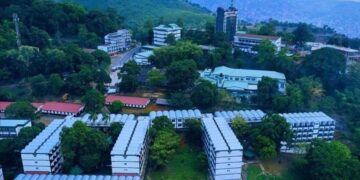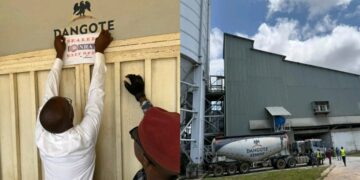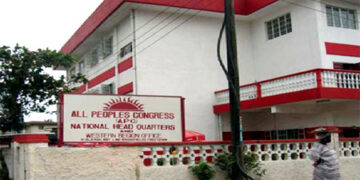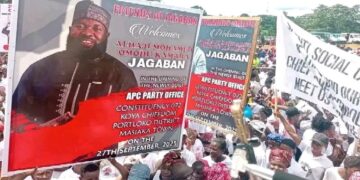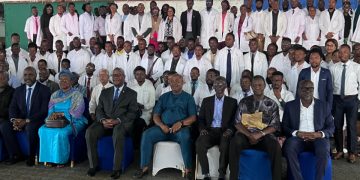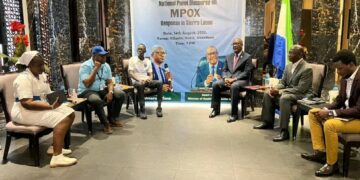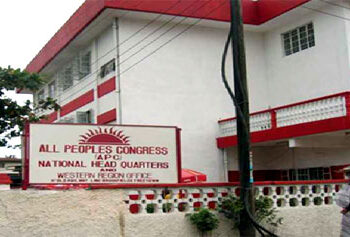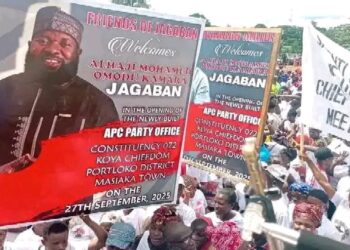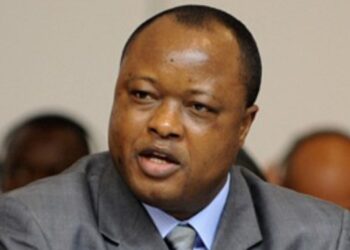Pa Kaprr Yoni Emmanuel Sesay
The All People’s Congress (APC) was never intended to be a conventional political party. From its inception, it was conceived as a remedy for Sierra Leone’s chronic political and social ailments.
Its’ very initials – A.P.C, evoked the name of a widely trusted analgesic tablet from the mid-20th century, renowned for soothing headaches, reducing inflammation, and calming persistent pain.
When the late Muctarr Kallay proposed the name at Sheik Gibril Sesay’s residence, it resonated immediately. The symbolism was unmistakable: the APC would be the medicine to relieve the headache of bad governance, the fever of poverty, the inflammation of illiteracy, and the throbbing migraine of regionalism.
For decades, this imagery was more than metaphor. It defined the APC’s political identity and organisational ethos. The party rose not merely on rhetoric but on two wings of pragmatism – practical mechanisms designed to ensure internal discipline, unity, and national relevance.
The first wing was Election by Selection, codified in the 1981 Constitution. This system was not a rejection of democracy but a deliberate refinement of it. Aspirants for party or national office were not simply self-nominated or chosen through open delegate ballots. Instead, a first ballot produced a shortlist – usually two or three candidates with the highest votes.
The final selection was made through scrutiny, mentorship, and principled judgment by party elders or authorised leadership bodies.
Election by Selection balanced democratic input with stewardship, ensuring ambition was aligned with loyalty, discipline, and the party’s long-term vision. It served as a pragmatic safeguard against opportunism and reckless populism, providing continuity, credibility, and alignment with the party’s mission.
While critics might argue that such a system could entrench elites or reduce transparency, its purpose was to filter ambition through experience and service, not to suppress merit. When applied judiciously, it prevented short-term popularity contests from undermining long-term national and party interests.
The second wing was the Backbench Principle, an uncodified cultural norm requiring members to serve faithfully in the background before aspiring to leadership. Ambition was tempered by loyalty and experience. This principle acted as a stabilising force, nurturing leaders who understood the party’s traditions and responsibilities before stepping forward.
Together, these wings formed the active ingredient of the APC tablet: a pragmatic balance that healed national headaches while insulating the party from internal fractures. Under these angelic wings, the APC never democratically lost a general election.
In recent years, the APC’s internal balance began to strain. Judicial intervention culminated in the 2022 Constitution, gazetted on 7 March 2022. The Supreme Court of Sierra Leone, in adjudicating internal disputes, imposed reforms that reshaped the APC’s internal structures.
Articles 60 to 63 set eligibility requirements for party offices: five years’ membership for national officers and presidential candidates, two years for parliamentary aspirants, all to be elected by secret ballot through delegates at national or local conferences. On paper, the changes appear orderly and democratic.
In practice, however, they represent a departure from the original APC formula. Where Election by Selection once required mentorship, stewardship, and rigorous vetting, eligibility now rests largely on membership duration and delegate votes. The secret ballot, though a democratic ideal, risks fostering factionalism, populism, and transactional politics, particularly where internal oversight is weak.
Most strikingly, Article 80 requires a 67% supermajority for constitutional amendments. While safeguards against changes are necessary, this threshold exceeds the 55% required for national presidential elections, creating an internal governance structure that is more rigid than the national Constitution itself.
By centralising amendment powers and excluding advisory organs, Article 80 entrenches factional dominance, silences grassroots voices, and reduces flexibility, potentially replacing pragmatic governance with procedural inflexibility.
The consequences are already evident. The APC now resembles a fluxional ammonia molecule – constantly flipping, rearranging, and destabilising. In chemistry, fluxionality describes molecules whose atoms rapidly shift positions; such structures require strong bonding forces for stability.
In politics, that stabilising force was pragmatism. Through Election by Selection and the Backbench Principle, the party had long prevented factional chaos while preserving its identity as a national remedy. Without that stabilising bond, fluxionality risks disorder, instability, and weakened governance capacity.
The 2022 reforms also raise philosophical concerns. The APC’s founding vision was tied to constructive nationalism – the principle that internal discipline and unity should serve the national interest above personal ambition.
By imposing a 67% supermajority and narrowing the amendment process, the party risks inverting this principle: protecting entrenched interests rather than enabling responsive governance.
Compared with Sierra Leone’s national Constitution, where legitimacy is earned through broad but achievable consensus (55% for presidential elections) and amendment mechanisms remain flexible, the APC’s new framework risks alienating grassroots members, stifling innovation, and discouraging constructive debate.
The APC’s predicament is not unique. In 1995, the British Labour Party under Tony Blair scrapped Clause IV, abandoning its historic commitment to common ownership. The move was politically expedient but ideologically costly, alienating parts of its base and fostering internal divisions that lingered for decades.
Similarly, in the name of modernisation, the APC now risks amputating its historical safeguards. Replacing Election by Selection with unfiltered delegate votes and imposing excessive amendment thresholds may produce short-term appearances of order but undermine the very foundations that made the party a stabilising force.
Reform is necessary, but reform without continuity is rupture; modernisation without pragmatism is reckless experimentation.
Parties that discard historical mechanisms in the name of expediency often achieve short-term order at the cost of long-term identity and cohesion. The APC must pursue organic, context-aware reform, not judicially imposed rigidity.
The issue is not whether the APC should evolve, it must. No institution thrives through ossification. But evolution must be guided by its original purpose: to serve as Sierra Leone’s political remedy, not as a hollow placebo.
As 2028 approaches, the APC faces a critical choice. It can persist with rigid, factional structures that risk internal paralysis, or it can rethink and re-engineer governance, restoring the angelic wings of pragmatism and loyalty that once carried it.
This is a call for strategic introspection. The party must balance democratic participation with pragmatic oversight, tether ambition to service, and ensure that reform strengthens rather than fractures the organisation.
Sierra Leone’s political landscape remains scarred by poverty, illiteracy, and transactional politics. A party aspiring to govern effectively must guard against the corrosive influence of money and populism. Secret ballots alone, without supporting structures, risk rewarding wealth over principle.
The APC’s strength has always been its ability to blend principle with practicality. If it can restore that balance, re-grow its wings, and reassert its role as a national analgesic, it can once again offer comfort and stability.
But if reform hardens into rigidity and populism replaces pragmatism, the party risks becoming a hollow placebo, a capsule incapable of healing the nation’s political migraines. The choice is clear. The time to rethink is now.
The title of this reflection – “The Constitutional Reform That Deforms the APC Party”, serves as a reminder that reform without prudence risks eroding the very cure the party was designed to deliver.
















